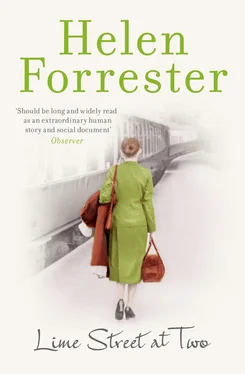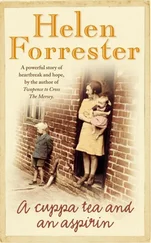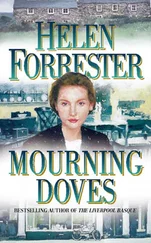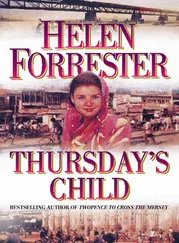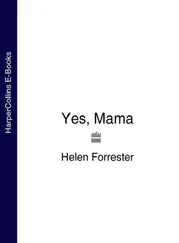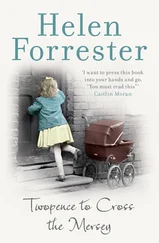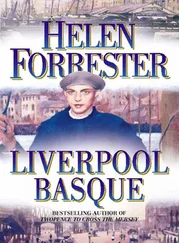I wanted to die.
Alan had been in the Air Force since July, 1939, and I missed him very much. I did not see much of Fiona, who came next after Alan in the family. She worked as a clerk in a magazine distributor’s office and had a number of men friends who took her out in the evenings to dinners, dances or the cinema. My parents rarely spoke, except to quarrel. The four younger children, Brian, now aged seventeen, Tony, aged fourteen, Avril, twelve, and Edward, aged nine, had in August, 1939, been evacuated to the country for safety, but early in 1940 Mother brought them home again, because the Government had demanded a modest financial contribution to their upkeep while they were away.
Brian finished school that year, and went to work for a shipping agent in the city. He also joined the City Police ARP Messenger Service, a group of boys with bicycles who, when the telephone lines were blown down during air raids, acted as messengers between hospitals, police, air-raid wardens and rescue squads, and rest centres for the homeless. Father used a bicycle to get to work, and Brian borrowed the machine at night.
On their return to Liverpool, the youngsters faced almost immediately four sharp, frightening air raids. No damage was done in our district.
I had suggested to Mother that, with the fall of France, it would be easier for the Germans to bomb the north of England, and perhaps we should leave at least the younger children in the country, where they were being fairly well looked after by my father’s sisters and, in the case of Avril, by a friend of my aunts. Mother would not hear of it; it was cheaper to bring them home.
Now she said to me, ‘See, the Germans are only interested in bombing the north end of the docks. We are quite safe, down here at the south end.’
I held my tongue.
Fortunately for our children, the Government had reopened the city schools. At the beginning of the war they had been closed, because their teachers had to accompany the evacuees to the country. Some children, however, were never evacuated; they ran wild in the streets, and vandalism and theft became widespread. When the trickle of children returning from evacuation became a torrent, many teachers were recalled, and the small predators went back to learning to read and write.
It says a great deal for the dedication of the teachers at that time, that despite the upheavals in their own lives and the dislocation of being evacuated, they managed to teach Tony and Edward well enough for them to win scholarships to grammar school. This made it possible, later on, for both boys to gain university degrees.
Nobody seemed to give much attention to little, blonde Avril, the second youngest member of our family. She was only a girl, equally frightened of being re-evacuated and of the air raids. In a chaotic world, she plodded on through elementary school as best she could.
The return of the children made Mother reopen, yet again, the question of my giving up my work and staying home to look after them.
As I washed the dishes and she dried them, she said without preamble, ‘Now the children are back, Helen, I expect you to stay at home. You can give your notice in on Friday.’
The idea of keeping a daughter permanently at home, often denying her marriage, died hard. But I felt I had endured enough in my early teens when I had been forced to keep house and, as the housekeeper who did not have to go to work, found myself reduced to a point bordering on starvation – the workers were fed and clothed first, the children next, and the woman at home was often left with nothing.
I did not, at first, answer Mother. This was before Harry’s death and I was buoyed up by the thought that in a very few months, I would have only a loving husband to care for.
‘I don’t think it is necessary, Mother,’ I replied carefully. ‘Couldn’t we manage the house between us? I’m getting good training as a social worker – it should lead to something better.’
Mother put the last pile of plates on to the kitchen shelf, while I emptied the washing-up bowl. She said scornfully, ‘You’ll get nowhere without a degree, so what’s the use?’ She glanced impatiently round the tiny, stone-tiled kitchen, with its greasy, deal table, and sandstone sink with a solitary cold water tap. ‘Now, where are my curling tongs?’
‘On the mantelpiece in the living-room,’ I replied mechanically, and I followed her into it, as I shook out the wet tea towel, ready to hang it to dry on the oven door of the old-fashioned range. The range took up nearly the whole of one wall of the room, and I noticed that its iron frontage badly needed blackleading.
Mother found her tongs and thrust them into the fire, and I silently draped the tea towel over the oven door. While the tongs were heating, she combed her hair quickly, in front of a piece of mirror balanced on the mantelpiece.
‘You know very well we can’t mange, Helen,’ she began again. ‘It was difficult enough to manage when the children were evacuated.’
‘They’re not babies any more, Mother. They could all help. Brian and Tony are big enough to queue in the shops, or even help with the cleaning. Or why can’t Fiona take a turn at keeping house?’
‘Fiona is too frail – and she doesn’t know how. And boys can’t do domestic work. How stupid can you be?’
‘Well, why can’t they?’
Mother paused with hot tongs poised to make a curl at the side of her face. She said angrily, ‘Helen, you are being impudent. When I say you are to do a thing, you do it, my girl.’
‘No, Mother,’ I responded with unusual temerity. ‘I am not staying home again.’
I thought Mother was going to strike me with the hot tongs, and I stepped back hastily.
‘Don’t talk to me like that. I won’t have such nonsense. I’ll talk to your employer. I’ll have you dismissed.’ Her face flushed with anger, and she seized a piece of her hair and rolled it on the tongs, as if she were about to pull it out.
I was scared. I had no idea what the ladies at work might do, if approached by an angry mother. They might very well agree to let me go to get rid of a shouting harridan on their doorstep. Mother saw her chance in my frightened face, and she pointed the tongs at me, and said, ‘You have to learn, my lady, the facts of life. You can’t choose what you want to do. You have to do what I say.’
How I wished Harry was there. I would have turned and run to him, begged him to find me a place to shelter until we could marry; it was, after all, only a little while until we would be married. But Harry was at sea. I thought of Father, the weaker parent, and burst out, ‘I think we should talk about this with Father.’
But Mother was not listening. She was ranting about feckless daughters and how she would be worked to death, as she continued feverishly to put curls in her hair. Occasionally, she would pause in her endeavours to shake the tongs at me, as I stood like a paralysed rabbit in front of her.
I was saved by Edward’s coming in. He had fallen down and grazed his knees. They were bleeding and I took him into the kitchen to wash them, while Mother went upstairs to find a piece of old sheeting we kept for bandages.
By the time we had mopped up the blood and the tears, it was time for Mother to go to the cinema, and with a sharp, ‘I’ll talk to you later,’ she put on her hat and coat and shot out of the house. I was left to put Avril and Edward to bed and to wonder whether I should, perhaps, just capitulate, and leave when I married.
We might have been able to afford a little help in the house, between all of us, but my parents were great fritterers of money. They both smoked heavily, and my father drank. There was always money for Mother to go to the cinema, which she did twice a week at least; always money to buy, for show, a piece of furniture for the sitting-room, paid for on the hire-purchase system, a most expensive way to buy anything; money for clothes for Mother and Fiona. But there was never enough for good, plain food, for coal, blankets, soap, for underwear for the younger children. We were always short of necessities, and I knew from experience that, made to stay at home, I could be the most deprived person of all.
Читать дальше
